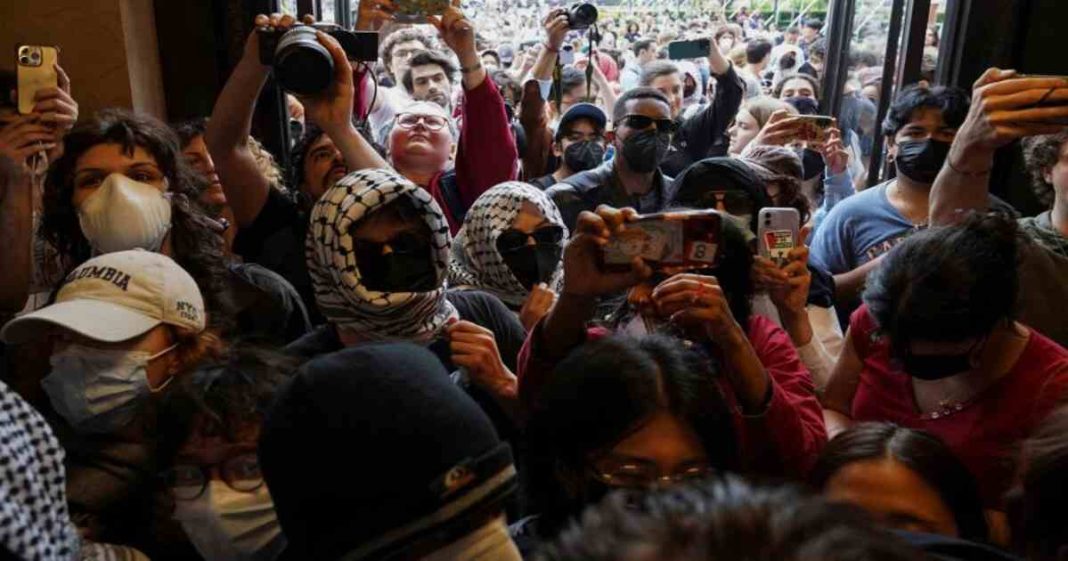Dozens of pro-Palestinian protesters were arrested at Columbia University on Wednesday after they seized the main reading room of Butler Library in one of the largest demonstrations on campus since 2023. According to multiple reports, between 70 and 80 individuals—many masked and dressed in keffiyehs—entered the library and refused to leave, prompting the university to request intervention from the New York Police Department.
Read More: Bill Gates to give away $200 billion by 2045, says Musk is ‘killing’ world’s poorest children
Videos posted online show protesters chanting, beating drums, and unfurling banners reading “Strike for Gaza” and “Liberated Zone” inside the Lawrence A. Wein Reading Room. Demonstrators reportedly renamed the library the “Basel Al-Araj Popular University” in honor of the Palestinian activist killed by Israeli forces in 2017. University officials confirmed that two public safety officers were injured in a scuffle when individuals tried to force entry. At least one protester was carried out on a stretcher.
Heavy NYPD Presence, Dozens Detained
The NYPD responded in force and swept through the six-story library, detaining protestors with zip-tie handcuffs and placing them into vans. While no formal charges have been announced, Columbia has said identification of those involved was being recorded and that disciplinary action will follow.
Acting University President Claire Shipman called the protest “outrageous” and “utterly unacceptable,” emphasizing the disruption to academic life during the final exam period. She said the university had “no choice” but to seek NYPD assistance, citing safety concerns and the presence of individuals unaffiliated with Columbia.
Trump Administration Responds With Crackdown
The protest comes amid intensifying scrutiny from the Trump administration, which has accused Columbia and other elite universities of tolerating antisemitism on campus. U.S. President Donald Trump and Secretary of State Marco Rubio both responded swiftly, with Rubio stating that visa statuses of participants would be reviewed. The administration has already revoked hundreds of international student visas and threatened deportations for those tied to similar campus protests.
In March, Columbia agreed to several administration demands—including protest mask bans and revised oversight of academic programs—to avoid the loss of nearly $400 million in federal research funding. A lawsuit by faculty members challenging the funding cuts is ongoing. Trump has recently expanded his crackdown, terminating $2.2 billion in funding for Harvard and issuing warnings to over 60 universities.
Student Groups Demand Divestment
The protest was organized in part by Columbia University Apartheid Divest, a coalition demanding the university cut ties with weapons manufacturers and companies supporting Israel’s military operations. The group denounced the police response as “violent repression” and accused Columbia of “escalating repression” instead of addressing legitimate concerns over its $14.8 billion endowment. Similar protests have erupted across the U.S., including at the University of Washington, where 34 demonstrators were arrested earlier this week and 21 students have since been suspended.
Campus on Lockdown as Protests Continue
In response to the occupation, Columbia has tightened campus security. Only students and faculty with valid university IDs are now permitted inside buildings, with same-day alumni and guest access suspended.
Read More: Global militaries to study India-Pakistan fighter jet battle
New York Mayor Eric Adams and Governor Kathy Hochul both issued statements condemning violence but affirming the right to peaceful protest. Adams warned outsiders to leave the campus or face arrest, saying, “We will not tolerate hate or violence in any form in our city.” Despite growing pressure, student activists insist they will continue disrupting university operations until Columbia meets their demands for full divestment from what they describe as “imperialist violence.”














